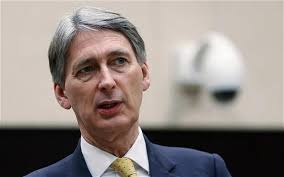Britain has abandoned its plans to reach a budget surplus by 2019-20, as official forecasts show a weakened gross domestic product and rising debt in the wake of exiting the European Union.
Chancellor of the Exchequer, Philip Hammond, confirmed the economic slowdown in his first budget speech since the June referendum.
Hammond revealed that the Office for Budget Responsibility (OBR) had slashed its growth forecasts from 2.2 per cent in March to 1.4 per cent.
He predicted an increased debt until 2018, rising from 84.2 per cent of GDP in 2015-16 to 87.3 per cent in the 2016-17 and 90.2 per cent in 2017-18.
Hammond said that the OBR report reflected the “underlying strength and resilience” of the British economy, but acknowledged the toll that Brexit-related uncertainty is taking.
The Chancellor cited higher inflation caused by the depreciation of the pound which has weakened consumer demand and greater uncertainty which has reduced investment levels.
He confirmed that Britain would be sticking to its plan of decreasing corporation tax from 20 per cent to 17 per cent by 2020.
There was speculation after Prime Minister Theresa May said on Monday that the government may announce a further drop in corporation tax to stay competitive.
Hammond announced a crackdown on tax avoidance by multinationals, with an estimated 5 billion pounds (6.2 billion dollars) to be raised from the largest businesses in Britain.
The government also offered a number of minor everyday concessions to the British public to compensate for rising inflation, which is predicted to negatively impact living standards.
These included an increase in national living wage in April from 7.20 pounds an hour to 7.50 pounds an hour and a freeze on fuel duty.
John McDonnell, Hammond’s counterpart in the opposition centre-left Labour party, urged the government to keep Britain in the EU single market in response to the budget speech.
May, who has been criticised for lacking clarity in her plan to take Britain out of the EU, has so far declined to say if leaving the single market is a “red line” in her Brexit negotiations.(dpa/NAN)


